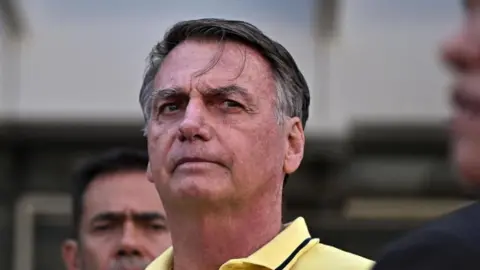The coup trial of Brazil's right-wing former President Jair Bolsonaro will enter its final stage on Tuesday. He is accused of masterminding an attempt to stay in power after losing his bid for re-election in 2022, which culminated in his supporters breaking into and vandalising government buildings in the capital, Brasília.
A panel of five Supreme Court judges is expected to reach a verdict by 12 September. Bolsonaro has always denied any wrongdoing and said the charges were politically motivated.
His cause has been adopted by US President Donald Trump, who has called the trial a witch-hunt, using it as justification for imposing tariffs on some Brazilian goods and sanctioning the Supreme Court judge leading the proceedings.
If convicted, Bolsonaro could face more than 40 years in prison. It is expected he could be present in court for at least the first and last day of this final phase of the trial.
He and seven other defendants, who worked closely with him in government face five counts, all related to attempting a coup. Bolsonaro has been charged with leading an armed criminal organisation, attempting the violent abolition of the democratic state of law, and damage to federal property.
The allegations date back before his supporters stormed government buildings on 8 January 2023. Following an extensive investigation, police alleged that he and other officials had been planning acts to abolish the democratic rule of law and keep him in power as early as 2019.
Police say he had full knowledge of a plan to assassinate Luiz Inácio Lula da Silva and his running mate. Investigators cited captured dialogues between the alleged conspirators and meetings at the presidential residence that support the charges.
Bolsonaro is also accused of calling a meeting with military commanders in December 2022 to present a coup plan, which some refused to support while one expressed backing, rendering the claims still controversial.
Additionally, Bolsonaro's actions during the 2022 election and beyond have raised alarms, as he spread misinformation about the electoral system and refused to concede defeat after narrowly losing to Lula.
The proceedings are highly anticipated, with Justice Cristiano Zanin moving forward with the case, having already gained attention for its political significance in Brazil’s current climate.
A panel of five Supreme Court judges is expected to reach a verdict by 12 September. Bolsonaro has always denied any wrongdoing and said the charges were politically motivated.
His cause has been adopted by US President Donald Trump, who has called the trial a witch-hunt, using it as justification for imposing tariffs on some Brazilian goods and sanctioning the Supreme Court judge leading the proceedings.
If convicted, Bolsonaro could face more than 40 years in prison. It is expected he could be present in court for at least the first and last day of this final phase of the trial.
He and seven other defendants, who worked closely with him in government face five counts, all related to attempting a coup. Bolsonaro has been charged with leading an armed criminal organisation, attempting the violent abolition of the democratic state of law, and damage to federal property.
The allegations date back before his supporters stormed government buildings on 8 January 2023. Following an extensive investigation, police alleged that he and other officials had been planning acts to abolish the democratic rule of law and keep him in power as early as 2019.
Police say he had full knowledge of a plan to assassinate Luiz Inácio Lula da Silva and his running mate. Investigators cited captured dialogues between the alleged conspirators and meetings at the presidential residence that support the charges.
Bolsonaro is also accused of calling a meeting with military commanders in December 2022 to present a coup plan, which some refused to support while one expressed backing, rendering the claims still controversial.
Additionally, Bolsonaro's actions during the 2022 election and beyond have raised alarms, as he spread misinformation about the electoral system and refused to concede defeat after narrowly losing to Lula.
The proceedings are highly anticipated, with Justice Cristiano Zanin moving forward with the case, having already gained attention for its political significance in Brazil’s current climate.






















